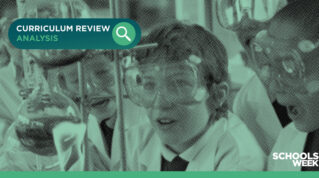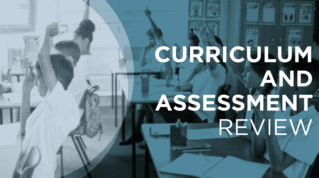Cutting the volume of content in primary school lessons and fewer GCSE exams are being considered as part of reforms by the government’s curriculum review.
The review’s interim report, published today, also signals changes to the EBacc performance measure and a subject-by-subject review over concerns the balance of content is “inhibiting mastery”.
However, the review ruled out “fundamentally changing” the number of subjects studied at GCSE, A-levels or ditching SATs.
You can read our full round-up piece of all the proposed changes here.
A curriculum review source said “the mainstay of the existing education architecture is doing pretty well and can remain as stands”. Instead, the review – which had 7,000 responses – had “heard issues within those that we’ll be digging into”.
One such issue is the “performance measures and the behaviours that they incentivise”.
Performance measures review
The interim report said its call for evidence had identified the English Baccalaureate – a suite of five academic subject areas all pupils are encouraged to enter – as one of “two main barriers to achieving breadth and balance at key stage 4”, alongside the volume of content.
Responses “have highlighted that the EBacc performance measures may unnecessarily constrain student choice (and, consequently, their engagement and/or achievement)”.
While the report said the review remained “strongly committed to the progress performance measures which focus on the difference a school makes”, it is “right that we review the impact of performance measures on curriculum breadth, depth, and choice for all pupil groups”.
“The intention behind the EBacc to improve access to a comprehensive, academic curriculum for all should be acknowledged, but as the review progresses, we will also consider whether this remains the most effective means of achieving this objective.”
Scope out reducing number of GCSE exams
In its interim report, the review said it would not “fundamentally change the number of subjects that students study or are assessed in at GCSE.
“Given all of the evidence, we are clear that traditional examined assessment should remain the primary means of assessment across GCSEs.”
But one area highlighted as an issue was the assessment volume at key stage 4.
Students in England “typically sit between 24 and 31 hours of exams in year 11”. This is comparable to Singapore but “significantly more than other high-performing jurisdictions such as Ireland (16 hours)”.
Previous reforms reduced the use of coursework and other non-exam assessment
This means a student’s grade is “predominantly (or entirely) determined by a student’s performance in exams ‘on the day’, rather than being a reflection of their performance at different points across their course”.
The next phase of the review will “consider carefully whether there are opportunities to reduce the overall volume of assessment at key stage 4 without compromising the reliability of results, and therefore the trust that stakeholders have in these qualifications.
It will take a “subject-by-subject approach to consider assessment fitness for purpose and consider the impact of different assessment methods on teaching and learning”.
“We will consider potential risks and trade-offs with non-exam assessments, such as deliverability (including the impact on teacher workloads), the risk of malpractice and risks to equity.”
SPAG and writing assessments face scrutiny
SATs are also here to stay, with the review calling them “an important tool in holding schools to account for the progress and attainment of their pupils, and to ascertain whether pupils have learned the national curriculum”.
Given this, “we are clear that formal assessments are an important part of key stage 1 and 2”.
Education secretary Bridget Phillipson said the review would take the curriculum “into the modern era”.
“That means keeping what’s working and evolving what’s not. The report is clear on the importance of primary school assessment, which are simply non-negotiable if we are going to keep pushing standards up for every child and close the attainment gap.”
However, the review also heard concerns that the standalone end of key stage 2 assessment on grammar, punctuation and spelling “might lead to the teaching of textual features in isolation at the expense of a sound understanding of reading and writing”.
“We will review the curriculum and how this assessment might better equip pupils to use these foundational building blocks fluently.”
The review also heard concerns that the writing assessment at the end of key stage 2 “does not validly assess pupils’ ability to write fluently and does not incentivise effective teaching of writing”.
The next phase “will examine how the assessment of writing at key stage 2 can be improved to support high and rising standards”.
Primary school lesson content review
The amount of content prescribed through the national curriculum at primary level is also under review.
The review heard “that the curriculum at key stages 1 and 2 is not effectively balancing depth and breadth.
“This is reported to lead to a struggle to cover all content with sufficient depth and negatively affects pupils’ ability to master foundational concepts.”
‘Workplace of the future’ focus
In its next phase, the review will look at the “volume of specified content at key stages 1 and 2 to ensure that a good level of breadth across the curriculum is achievable, while continuing to drive high and rising standards in all subjects”.
The review, overall, commits to a “knowledge-rich curriculum”, but it warned a changing world “necessitates that the curriculum keep pace; including a renewed focus on digital and media literacy, and a greater focus on sustainability and climate science”. Another example given is equipped pupils for an “increasingly AI-powered world”.
The review said pupils also want more to be taught on financial education, careers knowledge and politics.
“The Review will develop a cutting-edge curriculum, equipping children and young people with the essential knowledge and skills which will enable them to adapt and thrive in the world and workplace of the future.”
















Your thoughts